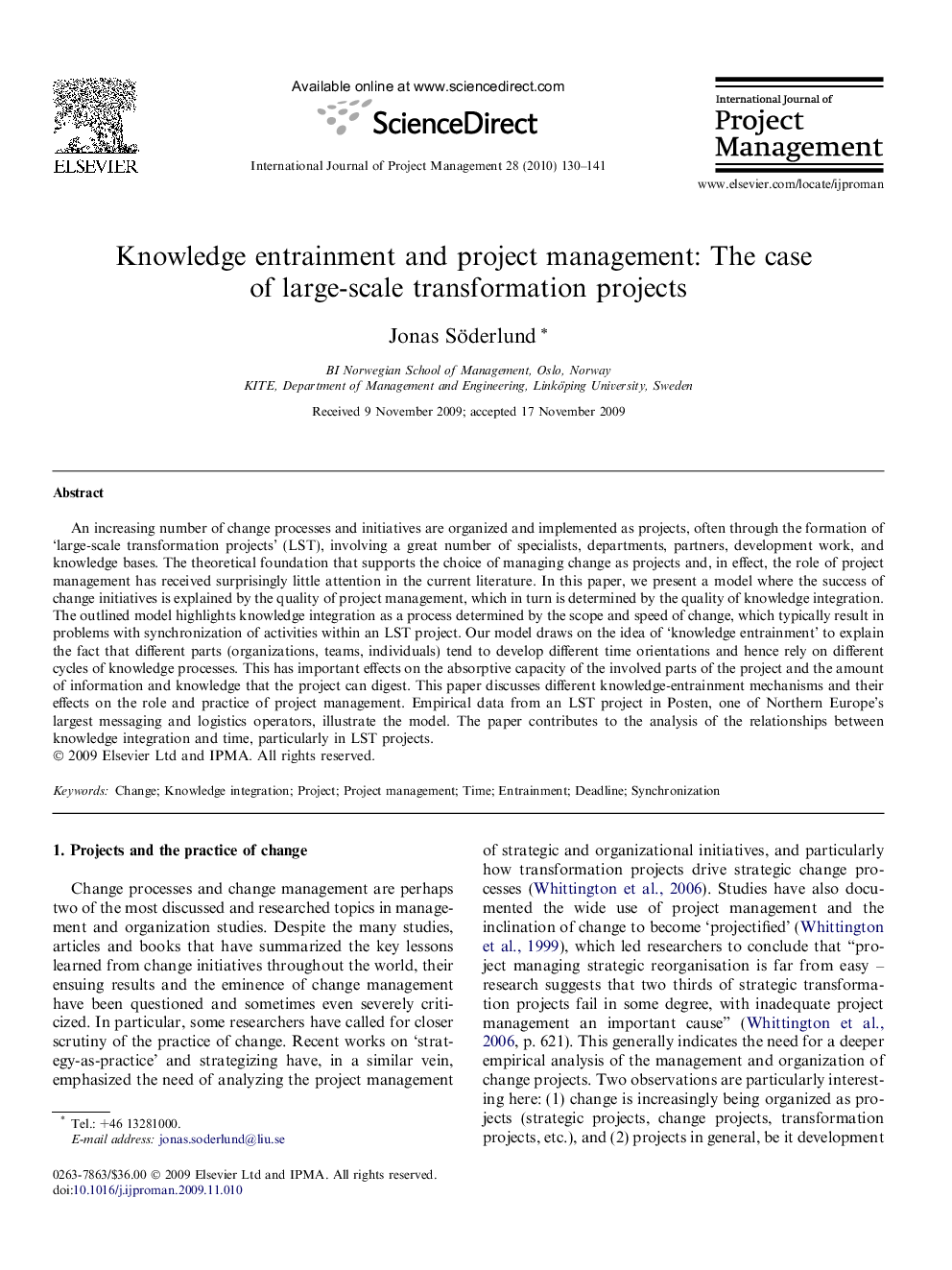| کد مقاله | کد نشریه | سال انتشار | مقاله انگلیسی | نسخه تمام متن |
|---|---|---|---|---|
| 276024 | 1429714 | 2010 | 12 صفحه PDF | دانلود رایگان |
عنوان انگلیسی مقاله ISI
Knowledge entrainment and project management: The case of large-scale transformation projects
ترجمه فارسی عنوان
هماهنگ سازی دانش و مدیریت پروژه: پروژه های تحول عظیم
همین الان دانلود کنید
دانلود مقاله ISI انگلیسی
رایگان برای ایرانیان
کلمات کلیدی
تغییر - یکپارچه سازی دانش - پروژه - مدیریت پروژه - زمان - افزودن حباب - آخرین مهلت ارسال آثار - همگام سازی
فهرست مطالب مقاله
چکیده
مقدمه
گزاره های اولیه و متغیرها
پایه های نظری مدل
LST و مدیریت تغییرات
موفقیت فرآیندهای تغییر و مدیریت پروژه ها
مدیریت پروژه و یکپارچه سازی دانش
یکپارچه سازی دانش و اهمیت هماهنگ سازی دانش
جمع بندی از مدل
مدیریت کردن یک پروژه LST: تفسیر یکپارچه سازی دانش
نتیجه گیری از بحث
ترجمه چکیده
شمار رو به افزایش فرآیندهای تغییر و طرح های اولیه سازمان دهی شده و به عنوان پروژه هایی به کار گرفته می شوند، اغلب از طریق شکل گیری «پروژه های تحول عظیم» (LST)، دربردارنده شمار عظیمی از متخصصان، دانشکده ها، مشارکت کنندگان، کارهای توسعه ای و دانش بنیان. پایه ریزی نظری که از انتخاب مدیریت تغییر به عنوان پروژه پشتیبانی می کند و در عمل، نقش مدیریت پروژه که در کمال شگفتی در متون معاصر توجه بسیار کمی به آن شده است. در این مقاله ما مدلی را ارائه می دهیم که موفقیت طرح های تغییر بوسیله کیفیت مدیریت پروژه توضیح داده شده است که در جای خود بوسیله کیفیت یکپارچه سازی دانش تعیین گردیده است. خطوط کلی این مدل، یکپارچه سازی دانش را به عنوان فرآیندی که بوسیله دورنما و سرعت تغییر لازم است معین می سازد که معمولا درنتیجه مشکل همزمان سازی فعالیت ها درون پروژه LST است. مدل ما ایده «هماهنگی دانش» را به کار می گیرد تا این حقیقت را که بخش های مختلف (سازمان، گروه ها، افراد) به منظور توسعه با گرایشات زمانی گرایش دارند و از همین رو بر چرخه های مختلف فرآیندهای دانشی تکیه می کنند. این امر تاثیر مهمی بر ظرفیت جذب کننده بخش های درگیر پروژه و حجم تاثیرات بر نقش و عمل مدیریت پروژه دارد. داده های تجربی از یک پروژه LST در پوستن، در یکی از بزرگ ترین اپراتور پیام رسانی و تدارکاتی اروپای شمالی، به ترسیم این مدل می پردازد. این مقاله با تحلیل روابط میان یکپارچه سازی دانش و زمان به طور ویژه در پروژه های LST سروکار دارد.
موضوعات مرتبط
مهندسی و علوم پایه
سایر رشته های مهندسی
مهندسی عمران و سازه
چکیده انگلیسی
An increasing number of change processes and initiatives are organized and implemented as projects, often through the formation of ‘large-scale transformation projects’ (LST), involving a great number of specialists, departments, partners, development work, and knowledge bases. The theoretical foundation that supports the choice of managing change as projects and, in effect, the role of project management has received surprisingly little attention in the current literature. In this paper, we present a model where the success of change initiatives is explained by the quality of project management, which in turn is determined by the quality of knowledge integration. The outlined model highlights knowledge integration as a process determined by the scope and speed of change, which typically result in problems with synchronization of activities within an LST project. Our model draws on the idea of ‘knowledge entrainment’ to explain the fact that different parts (organizations, teams, individuals) tend to develop different time orientations and hence rely on different cycles of knowledge processes. This has important effects on the absorptive capacity of the involved parts of the project and the amount of information and knowledge that the project can digest. This paper discusses different knowledge-entrainment mechanisms and their effects on the role and practice of project management. Empirical data from an LST project in Posten, one of Northern Europe’s largest messaging and logistics operators, illustrate the model. The paper contributes to the analysis of the relationships between knowledge integration and time, particularly in LST projects.
ناشر
Database: Elsevier - ScienceDirect (ساینس دایرکت)
Journal: International Journal of Project Management - Volume 28, Issue 2, February 2010, Pages 130–141
Journal: International Journal of Project Management - Volume 28, Issue 2, February 2010, Pages 130–141
نویسندگان
Jonas Söderlund,
